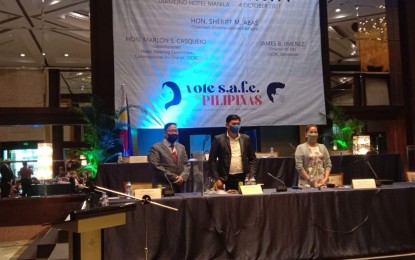
(Photo courtesy of Comelec)
MANILA – The Commission on Elections (Comelec) on Monday launched the local source code review (LSCR) of the automated election system (AES) to be used in the May 9, 2022 National and Local Elections (NLE).
Poll body officials headed by chairman Sheriff Abas welcomed the participants composed of political parties, citizen’s arm, civil society groups, at the kickoff activity held at the Diamond Hotel in Manila.
Commissioner Marlon Casquejo, head of the Steering Committee and commissioner-in-charge of the LSCR, said the procedure is a pre-election activity that is mandated by the law.
“The review of the human-readable instructions that define what the computer system will do -- commonly referred to as the source code -- is an innovation that was introduced by Republic Act No. 9369," he said.
Section 12 of Republic Act No. 9369 provides that "once an AES technology is selected for implementation, the Commission shall promptly make the source code of that technology available and open to any interested party or group which may conduct their own review thereof."
"In this sense, the activity that we are all going to be engaged in is integral and inseparable to the conduct of elections as any other. As the Chairperson of the 2022 National and Local Elections Steering Committee, allow me then to reiterate the overarching principles that should guide us all: Local Source Code Review is aimed at enhancing public acceptance, promoting transparency, and building public confidence in our Automated Elections System,” Casquejo added.
The objectives of the review are to ensure that the AES functions as it should or as expected and that the code is clean and without any embedded malicious code,
It also aims to identify any critical or major issues or errors that could potentially impact the outcome of the election.
“We intend for this review process to be as transparent and participatory as possible. We intend to preserve the integrity of our automated systems, in the same manner, that we aim to ensure that the upcoming automated elections run as smoothly as possible. And we want you to help us uncover possible issues with our systems inasmuch as we want the general public to know about our readiness and preparedness,” he said.
The stakeholders will review the following: the Election Management System (EMS); the Vote-Counting Machine (VCM); the Consolidated Canvassing System (CCS); and all other related systems programmed and developed by the provider.
“Each and every one of us-the reviewers, the media, the political parties and interest groups, the different branches of the government, and even the casual observers-plays a vital role in ensuring that the general public preserves their trust and confidence in our electoral process. The successful staging and completion of the Local Source Code Review is a positive and welcome step towards the completion of that goal,” Casquejo added.
The participants to the review, as of September 22, are Partido Federal ng Pilipinas (PFP), Partido Para sa Demokratikong Reporma, National Unity Party (NUP), Liberal Party of the Philippines, Unang Sigaw (Partido ng Pagbabago), Aksyon Demokratiko, Partido Demokratiko Pilipino Lakas ng Bayan, National Peoples Coalition.
Other participants include the Kaya Natin Movement for Good Governance, Joint Congressional Oversight Committee, Parish Pastoral Council for Responsible Voting (PPCRV), Democracy Watch, Kilusang Bagong Lipunan, National Citizens Movement for Free Elections (Namfrel), and Pwersa ng Masang Pilipino.
The LSCR will start on Tuesday and will end on March 31, 2022, at the 2nd floor Ruby Room of the Diamond Hotel from 9 a.m. to 5 p.m., Mondays to Saturdays, except holidays. (PNA)
